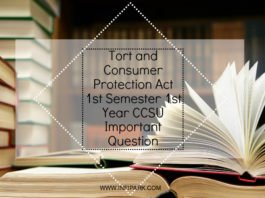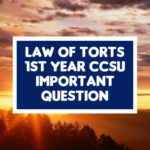EX TURPI CAUSA NON ORITUR ACTIO
This maxim literally means that an action does not arise from an immoral cause.
According to the law of...
Injuria sine Damnum
This maxim ‘ Injuria sine Damnum ‘ is just opposite to the maxim ‘ damnum sine injuria’ .
The word ‘ damnum ‘...
Malfeasance , Misfeasance and Non- feasance
Malfeasance:-
When an unlawful act is committed , it is called Malfeasance . The unlawful acts of Malfeasance are...
Innuendo
The term Innuendo means an explanatory statement in the plaint to be given by the plaintiff to the effect that though the...
Law of Torts 1st Year CCSU Important Question
Law of Torts
Q.1. DEFINE DEFAMATION AS TORT WITH ITS ESSENTIALS AND ALSO DISCUSS ITS EXCEPTION OR DEFENCES.
Justification and Fair Comment
Defamation is categorised as felonious tort meaning thereby it is civil wrong as well as crime . One can take both the...
False imprisonment and Malicious prosecution
The difference between false imprisonment and malicious prosecution may be shown in the tabular form as follows:
False imprisonment.
Malicious prosecution.
1.
In the case of false imprisonment...
Describe the Maxim Ubi jus ibi remedium.
Describe the Maxim Ubi jus ibi remedium.
Ans. Ubi jus ibi remedium - This maxim means that where there is...
Difference Between Tort and Crime
Though the tort and crime , apparently , seem to be resemble to each other , there are differences in between the two ....
Law of Torts with Case Laws
The law of torts, also known as tort law, is a branch of civil law that deals with civil wrongs or injuries...



























